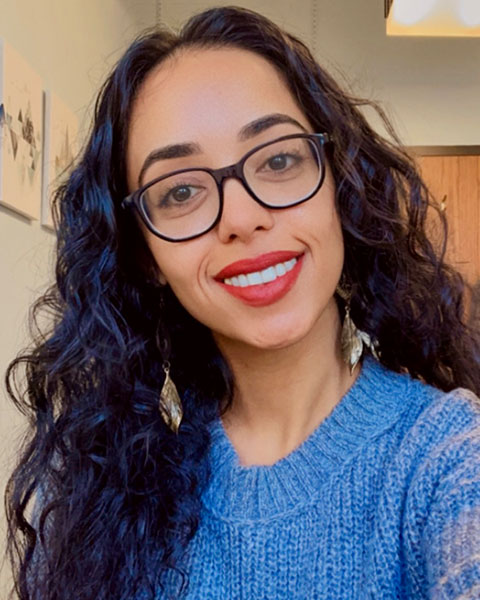Oppression and Resilience Minority Health
Symposium 83 - Emotion Regulation in the Face of Minority Stress: Mental Health Implications for Diverse Populations
Level of Familiarity: Moderate
Recommended Readings: Hatzenbuehler, M. L., Nolen-Hokesema, S., Dovidio, J. (2009). How does stigma "get under the skin"? The mediating role of emotion regulation. Psychological Science, 20(10), 1282-1289., Duker, A., Green, D. J., Onyeador, I. N., Richeson, J. A. (2022). Managing emotions in the face of discrimination: The differential effects of self-immersion, self-distanced reappraisal, and positive reappraisal. Emotion, 22(7), 1435., Aldao, A., Nolen-Hoeksema, S., & Schweizer, S. (2010). Emotion-regulation strategies across psychopathology: A meta-analytic review. Clinical Psychological Review, 30(2), 217-237.
, ,
-

Mark Shuquan Chen, M.S. (he/him/his)
Graduate Student
Columbia University
Jersey City, New Jersey, United States -
JS
Jose Soto, Ph.D. (he/him/his)
The Pennsylvania State University
University Park, Pennsylvania, United States -

Kiran Kaur, M.S. (she/her/hers)
Doctoral Candidate
University of Utah
Salt Lake City, Utah, United States -
AW
Andrea Wiglesworth, M.A. (she/her/hers)
Ph.D. Student
University of Minnesota Twin Cities, NSF- GRFP Fellow
Minneapolis, Minnesota, United States -

Madalyn Liautaud, M.A. (she/her/hers)
Graduate Student
The Graduate Center, City University of New York
Brooklyn, New York, United States -

Mark Shuquan Chen, M.S. (he/him/his)
Graduate Student
Columbia University
Jersey City, New Jersey, United States
Chair(s)
Discussant(s)
Presenter(s)
Emotion regulation (ER) is critical in the context of stressful life events (Joormann & Stanton, 2016) and plays a central role in various forms of psychopathology (Aldao et al., 2010). Although minority populations (e.g., racial, ethnic, gender, and sexual minorities) are more likely to experience identity-based stress, ER research has historically focused more on general forms of stress and less on minority stress. Understanding and targeting emotion regulation in the context of minority stress can offer a potential way to reduce mental health disparities and improve the cultural adaptiveness of evidence-based treatments, such as cognitive-behavioral therapy, when implementing ER techniques. This symposium will feature four talks that examine emotion regulation across multiple minoritized identities (e.g., Native American, transgender adults, ethnic minority) using a wide range of research methods (e.g., community-engaged focus groups, daily dairy, longitudinal surveys, meta-analysis, and laboratory experiments).
Presentation 1 will report a mixed-method study that examined what types of stressors do ethnic minority college students experienced, particularly those who may also be first-generation students, and how they regulated their emotions when experiencing these stressors. This study will also discuss quantitative data that showed how ER may buffer the association between acculturative stress and psychopathology (i.e., depression and anxiety). Presentation 2 will showcase a four-week longitudinal study that examined how difficulties in ER predicted depression and anxiety symptoms controlling for objective and perceived stress among Native American young adults. Presentation 3 is a 14-day daily diary study that examined changes in adaptive ER following discrimination among transgender adults, highlighting potential risk-resilience tradeoffs of the initial increase in adaptive ER followed by amplified vulnerability to cumulative discrimination experiences. The fourth presentation will be on meta-analytic evidence supporting greater adaptiveness of cognitive reappraisal among samples with a greater percentage of racial minority participants, followed by experimental evidence on the efficacy of cognitive reappraisal among racial minority adults and the role of stressor controllability. Finally, the discussant will synthesize these findings and discuss their implications for mental health among diverse populations who have been underrepresented in ER literature.
The studies included in the symposium not only offer various ways in which emotion regulation can be studied among minority populations but also draw attention to the consideration of emotion regulation in intersectional minority stress (e.g., gender and sexual minority of color). Overall, this symposium sheds light on how emotion regulation research can increasingly involve minoritized populations and how such knowledge can innovatively inform culturally adaptive interventions for vulnerable populations to improve resilience in the face of minority stress.
Learning Objectives:
- Improve attendees' understanding of the role that emotion regulation plays in mental health among mionoritized populations
- Introduce diverse research methods to study emotion regulation among minoritized populations
- Demonstrate the implications of emotion regulation in psychological interventions among minoritized populations
- Explain how the effect of cognitive reappraisal may differ across contextual factors
- Discuss the implications of these findings for clinical work focusing on emotion regulation with diverse populations
Presentations:
-
12:30 PM - 2:00 PM EST(SYM 83) Examining Associations Among Ethnic Identity, Acculturative Stress, Emotion Regulation, and Internalizing Symptoms: A Mixed-methods Community-engaged Study
Speaker: Kiran Kaur, M.S. (she/her/hers) – University of Utah
Co-author: Brian Baucom, Ph.D. (he/him/his) – University of Utah
Co-author: Sheila Crowell, Ph.D. (she/her/hers) – University of Oregon
Co-author: Monika Lohani, Ph.D. (she/her/hers) – University of Utah
Co-author: Anu Asnaani, Ph.D. (she/her/hers) – University of Utah
-
12:30 PM - 2:00 PM EST(SYM 83) Does High or Higher-than-usual Stress Predict Weekly Depressive and Anxiety Symptoms Among Native American Young Adults? Considering the Role of Emotion Regulation
Speaker: Andrea Wiglesworth, M.A. (she/her/hers) – University of Minnesota Twin Cities, NSF- GRFP Fellow
Co-author: Bonnie Klimes-Dougan, PhD (she/her/hers) – University of Minnesota Twin Cities
-
12:30 PM - 2:00 PM EST(SYM 83) Risk-resilience Tradeoffs in Discrimination-induced Use of Adaptive Emotion Regulation over Time Among Transgender Adults
Speaker: Madalyn M. Liautaud, M.A. (she/her/hers) – The Graduate Center, City University of New York
Co-author: Yikai Xu – New York University
-
12:30 PM - 2:00 PM EST(SYM 83) Cognitive Reappraisal, Affect, and Psychopathology Among Racial Minorities: Integrating Meta-analytic and Experimental Evidence
Speaker: Mark Shuquan Chen, M.S. (he/him/his) – Columbia University
Co-author: Qiyue Cai, M.A. – Arizona State University
Co-author: Simon M. Li, M.A. – Columbia University

.png)
